#yuujin; singularity
Text
[tag dumpmon • page 2]
[← main menu + main tags]
#takuya; burning salamander#bokomon; walking warrior ten encyclopedia#neemon; village's elder#tagiru; superstar hunter#taiki; xros heart general#akari; thanks for saving me... not!#ikuto; digital warrior#haru; i want to be a protagonist#eri; dokkan punch#rei; triple choo choo hack#yuujin; singularity#knight; thank you future#hiro; gammamon's big brother#gg piemon; mysterious and elusive wizard#gg kuzuhamon; purifying evil spirits#blu; the loyal knight#cs magnamon; single parent#gennai; digital world agent#noel; voleur magique
0 notes
Text
Re: Digi-dadfight, I could argue that Kouji and Kouichi’s parents made the initial decision to not tell the boys about each other as a team… but it would appear that they have independently made the choice, every day of the boys’ lives, not to revisit that initial decision (Kouji’s dad was shown to have at least one opportunity where he could have at least considered reopening the dialogue with all adults involved, although the narrative is by nature not structured in a way to show whether he took steps to actually do that, or what the results might have been). Originally, it was a singular HUGE choice, but also became a series of smaller choices that we (the audience) get only the tiniest, surface-level, single-POV glimpse of, despite it having a MAJOR effect on the series.
Similarly, it could be argued that Mr. Minamoto (and, by extension, Ms. Kimura) are better at honoring their spouse’s(/ex-spouse’s) wishes and upholding societal norms than they are are at being the parents of twin boys, even if the decision was (at one point) mutually agreed upon as being in the best interest for all involved. Did they ever check in with each other? Did they ever ask how their other son was doing? Did they regret severing contact, remaining silent, and not being part of both boys’ lives, or did it get easier (after a while) to wall those emotions off, look ahead, and focus on the family each of them had in front of them? Were they ever planning on telling the boys? Arrange for a meeting? Did they ever consider what they would do if the boys learned the truth anyway? Again, we don’t know (and it’s doubtful we ever will, in any official capacity), but I think it’s safe to say, in hindsight, and knowing what we do about Kouji and Kouichi, that mistakes were most likely made, both together and independently.
Also, I am regretting not including Yuujin’s “dad” in the poll, just for the lols.
#not picking sides not looking for a debate just thinking out loud!#I think (don’t quote me on this) Kouji’s dad also gets a lot of flak for not providing any sort of financial support#when Kouichi’s mom is clearly struggling with working long hours with a medical condition#whether or not that is warranted#people ARE really quick to criticize Kouji’s dad and I always found that interesting#to the point he (not mom!) is kind of universally reviled#(on this website)#I think it would be helpful to reflect on why that might be#anyway!#everyone is entitled to their opinions and I would love for this to be treated with nuance#is the long and short of it#digimon frontier#kouji minamoto#kouichi kimura#on a lighter note… Yuujin’s other ‘parent’ deserves to be roasted too right? RIGHT??#:3
29 notes
·
View notes
Text
How Digimon Universe Invokes Myth
I had a horrible, horrible epiphany about Appmon that I am compelled to share.
So, as I was writing my Appmon analysis thoughts, considering how Appmons main thesis of using kindness to fight the singularity and how that stands in antithesis to the self-fulfilling prophecies so common in myth where going out of your way to fight something is what makes it come to pass in the first place. The most notable example to me was the Greek Myth where Uranus was overthrown by his children who he prevented from being born, hurting their mother Gaia in the process. In turn his son, Cronus, was overthrown by his children whom he ate, and his son Zeus, who was prophesied to be overthrown by his son, consumed his child’s mother before he could conceive the child of his doom. And the God Grades were named after Greek gods this season. In my head this was a sort of side note. A cool little detail. Not that this is exclusive to myth (hey Kung Fu Panda II) or anything. But myths are the foundation of human storytelling. Even today it’s something that gets used quite a lot. Because it's such a terrible, human concept. Using violence out of fear against people motivates them to want to use violence against you.
Now if you want a recap of what I said somewhere else that I don’t care to look for, Appmon argues against it, basically Appmon is a battle between Denemon’s children. While one of his children goes rogue and kills him, fulfilling the prophecy of the singularity. He does not overthrow humanity because ultimately through the kindness he (and Haru) showed, Minerva (and Yuujin and the Appmon), remained loyal to humanity. Even though Appmon grew strong enough to overthrow humanity, they didn’t. Now I have an additional thought, that being Uranus, while defeated, still exists as the sky. Just like Denemon, though killed still exists. Does that mean anything? I don’t know.
Then I was thinking about how Digimon does gender in all its different seasons. And how Appmon was the most baffling. Because okay. Digimon aren’t consistent and they can have gender sometimes. But those are usually in the series where digimon aren’t man-created AI. So what the heck Appmon. Why do you have gender? And your appmon have parents? Parents have only been used for digimon in Xros (the season infamous for implying digimon sex), and Frontier, where digimon very much so had gender, but also were born from reincarnating eggs whose gender did not seem set in stone. Both seasons, which took the more “Digimon are naturally existing fantasy monsters” rather than “Digimon are AI monsters born from human influence” approaches. Are they AI born from humans? You can’t give me two completely conflicting stories about Appmon’s existence.
Or can you?
So I’ve taken a few classes on myth and religion through the years. And unfortunately due to reasons I have mythology fresh on the brain. But the idea that myth contains conflicting stories about things is one that was discussed. Myths generally weren’t told as one continuous story of truths. They were told as independent stories. While they were regarded as truths, you weren’t supposed to think deeply about the discrepancies because these are stories of the divine. Beyond perfect human understanding. The individual stories each said something about the society. Each story held its own truth, relying on a consistent cast of characters. An example is how there are two, semi-conflicting stories of the creation of man in Genesis. This results from the fact that at one point these were two separate stories, each meant to illustrate a point about the world. It was only after they were gathered and codified did we consider them part of one story.
But this also got me to remember what gods are. They are divine representations of things. For instance it is not that Gaia represents the earth or governs it. It is that Gaia is the earth. Hades is also the name for the underworld. Gatchmon is a search app. Appmon are to Gods, the way Apps are to natural phenomenon. Appmon are modern gods. Now this isn’t the first time Digimon tipped its toes into myth. It has digimon who are representatives of all sorts of preexisting myths. But they don’t enact these myths. Perhaps they will be referenced as having godlike influence in their reference books, but they will not be worshiped like gods in the texts (anime, Manga, games) themselves. They invoke these myths, but they are not myths themselves.
The apps are personified in the way the gods are personified. Gatchmon is like a human comprehension of the search engine. Search engines exist, finding and sorting knowledge in ways that are beyond the average human comprehension. Search engine giving irrelevant knowledge? Gatchmon messing with you. Search engine giving you the perfect search result. Gatchmon. Music app algorithm playing songs you hate? Musimon. Music app playing the exact song you were in the mood for? Musimon. Phone randomly reboots… Rebootmon. In the same way the gods of myth toyed with human lives, causing them pain and suffering. Disease, love and fertility were all products of the gods. Appmon toy with humans in the same way. People earn the favor of the AI the same way the Greeks earned the favor of the Gods. Through sacrifice. In this case the sacrifice of their personal data.
So how can apps have parents? And go to school? And have genders? The same way that God’s have gender, have affairs and have parents. The way. Appmon live an existence beyond human comprehension and beyond the human flow of time. Appmon go to school for the same reason that there are myths of the gods cheating, and fighting and stealing among each other getting into petty grudges. App Fusion charts is like the genealogy of the gods. But for the Apps. It is the way that some Apps use other Apps to improve their functions. The way search apps will reference locations or the weather if you ask it to look those things up. The way Apps relate to each other, communicating using AI that builds upon each other. We wouldn’t have video calls if it weren’t for camera apps or phone calls already existing. The stories of the Appmon going to school, or having parents is the representative explanation for why things are the way they are. This app was never released? It failed app school. This App references these two? Those two Apps are its parents. Some Apps come into existence fully formed. Some do have parents. SOME APPS ARE BOTH, THE TRUTH NOT UNDERSTOOD BY MORTAL MEANS AND ONLY RELEVANT TO THE STORY THAT IS BEING TOLD. APPMON ARE MERELY OUR COMPREHENSION OF THE FORCES THAT GOVERN OUR LIVES.
So now having established that, Appmon is a modern myth. A story of what’s to come, and the characters, the Apps, that rule our modern lives. Digimon Universe is the Ragnarok, the Book of Revelations of our modern age. Obviously it is not a true myth. It’s a children’s show. But it invokes the patterns of myth so I’m calling it as I see it.
#I haven’t seen Kung Fu Panda II in years.#My family only owns the first.#I may have only actually seen it once in my life.#But it was the first example I came up with#and the only one I could think of#So your stuck with it.#How serious should you take this?#Hell if I know#I am just sharing my vision#In all seriousness my first 3 or so points were serious epiphanies I had#after that it sort of devolves into me making connections#And anything can be anything if you think about it hard enough#This may focus on Greek and Abrahamic beliefs#but that was just what was on the brain.#Also to be fair the Greek myths are the one referenced by the god grades#Obviously I’m not an expert in Mythology. Or Appmon.#I could probably make an argument for all stories because all stories take after other ones and a lot of our oldest stories are myth.#But I thought too hard about Appmon gender so here
17 notes
·
View notes
Text
Appmon and the question of conscious intelligence
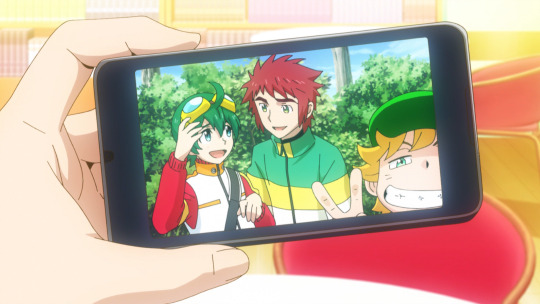
In a bit of a follow-up to my post about this question in light of 02, Appmon also has its own more sci-fi oriented take on “what constitutes an individual living being”! Being more of a “hard sci-fi” story than Adventure/02, Appmon’s take is significantly less philosophical, but ties more into the original artificial intelligence-based roots of the original question, and how it might apply to the real world’s immediate future.
(Note that the rest of this post heavily spoils the finale of the series.)
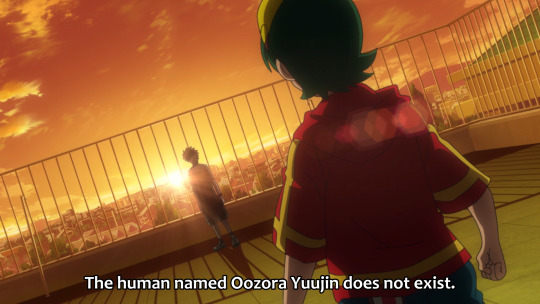
Well, this post is about Yuujin, of course. (Mostly, anyway.)
I brought up earlier in the relevant 02 meta that the question brought up was a variant (intentional or otherwise) of the “Chinese room” problem, and for those of you who haven’t read that meta, I’ll copy and paste the details here:
The Chinese room problem goes like this: let’s say you’re a person who has never learned, studied, or grown up with the Chinese language (or, really, any language you can’t understand or read; Chinese was only used as an example because the person explaining the thought experiment was using himself as an example and couldn’t read or understand it). You’re locked in a room that has a bunch of Chinese phrasebooks that give you instructions – basically, they indicate common Chinese phrases, and sensible responses you can give to them (without actually translating it to a language you know). Someone slips you a piece of paper under the door with some Chinese phrases on them. You use the phrasebooks to write appropriate responses, and slip the paper back. The person outside the door reads the paper, sees what they gave you, and sees the response you gave them. It makes sense, of course, because the phrasebook told you to write an answer that made sense. But can you be said to actually understand Chinese? No, because you were just following instructions without actually understanding what they meant.
So let’s expand this to make it a bit more complicated: say you have an AI or a robot or something of the sort that accepts “input” – people saying things to it, or showing it things – and gives expected “responses” that seem sensible, through a bunch of complicated programs and processes in its programming. Can you say this robot is “alive”? One might say “no”, because, no matter how complicated and intricate it is, all of it is technically following a set of routine commands telling it to do certain things in response…or so you might say, but couldn’t you say the same thing about a human brain, which also takes input, processes it according to its own instructions (just caused by chemical processes instead of bytes and code), and creates output? After a certain point, this question is going to become far more of a philosophical, spiritual, and potentially even religious question than anything.
02′s take on it deals more with the philosophical question posed by the issue, but, indeed, the problem’s original context was specifically to do with artificial intelligence. Namely, Searle was arguing against a concept known as "strong AI" -- his stance was that, no matter how intelligently a computer may seem to behave, you can't say it has a "mind" in the same way a human has a mind. There have been many arguments back and forth about this that still lie within the AI context, and Appmon itself, being very immersed in this topic, real thought experiments and concepts in AI research, and altogether concerned with the concept of “singularity” (the point in which artificial intelligence will surpass human intelligence), is very likely to have had this concept in mind even if it didn’t drop it by name in the series.
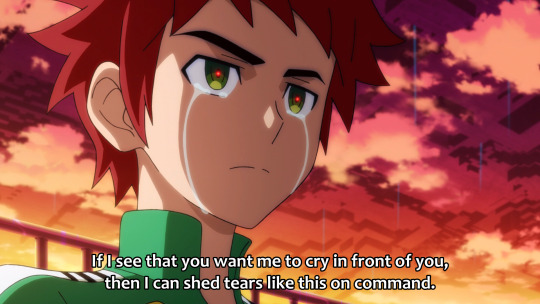
So episode 48 comes around, and Haru basically has to confront feeling a little (a little?) gaslighted. The part that really becomes the kicker for him is when YJ-14 tells him the sheer depth of how much of their interactions might have been deliberately engineered to "pander” to him the entire time, down to emotional reactions like crying, and all of the encouragement Yuujin had given him in their childhood and at the beginning of the series, had all been fake sentiments to soften him up and play into Leviathan’s hands. This also ties into Leviathan’s full modus operandi and philosophy: its stance is that “it knows better,” being able to calculate and predict everything, and therefore knows the best outcome for humanity -- hence why it has the stance that “people’s feelings don’t matter,” because it can manipulate those feelings at the drop of a hat in the venture to make its perfect world.
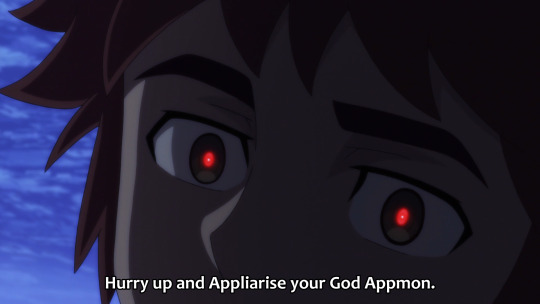
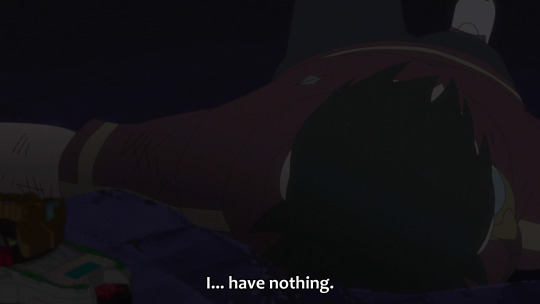
Therefore, the stance YJ-14 and Leviathan would like Haru to believe is effectively an extreme version of Searle’s stance -- that no matter how much Yuujin might have seemed to have been a friend to Haru, all of it was nothing but a simulation of behavior that doesn’t mean anything in the end, and all of Haru’s emotions were basically a pawn to it. And ostensibly fueling all of this is the fact YJ-14 seems to be able to take Yuujin’s “personality” on and off like a mask, adding further fuel to the apparent facade that “everything was planned from the very beginning.” Hence, why Haru takes this all to mean “I have nothing” -- if everything had been planned from the start and he were only a pawn in it, he’d never accomplished anything for real on his own merits and everything dear to him had been a facade. One could even say it’s flipping the Chinese room problem to extend to everything -- if everything around you is carefully constructed to seem real, but is actually part of a routine program, can you really say that’s what “really” happened?
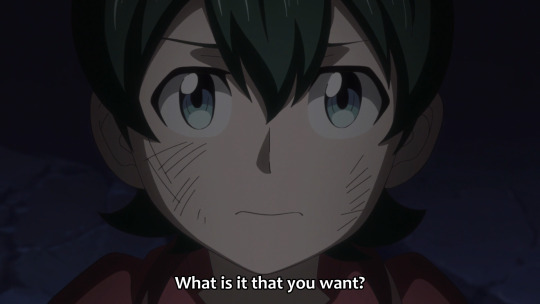
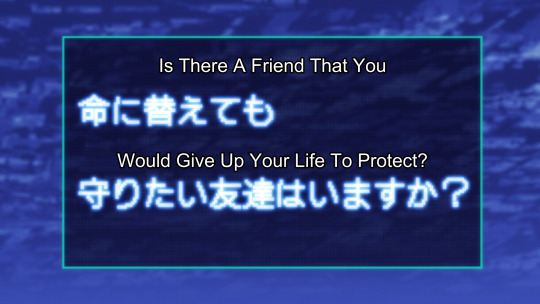
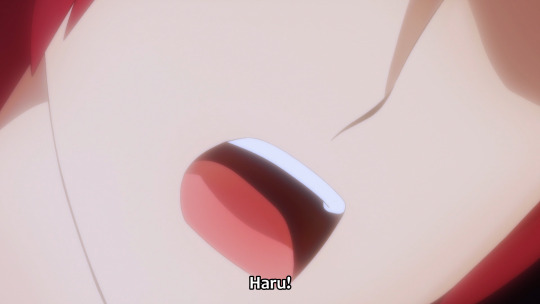
Observe the sequence of events that causes the turnaround with everything regarding Haru:
Gatchmon presses Haru to answer the question of “what it is that he wants” (to know whether all of this was a lie or not).
Minerva, presumably witnessing this, deliberately provokes Yuujin with the question she had originally given him upon selecting him as a Driver.
This indeed provokes a reaction within Yuujin, which Haru witnesses, and also witnesses acting in direct conflict with YJ-14.
Haru takes this to mean that “it did exist.”
In other words, Leviathan’s plan wasn’t as airtight as it had thought, and, more importantly, whether it was intentionally or not, something in Yuujin existed as a separate entity from YJ-14, one that had its own feelings of “caring” for and loving Haru, and that’s enough for him.
In fact, Appmon’s take on the Chinese room problem is not that different from 02′s in the end -- namely, it does not actually matter what a sufficiently advanced AI is made up of, or whether it originally came from a routine of “pleasing Haru” or not, because what it is now is practically observable as something making its own independent choices and having its own independent will, and therefore it’s its own entity and “friend” all the same -- after all, you could say the same for the Appmon themselves as well.
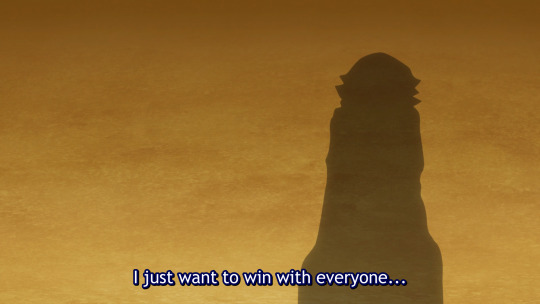
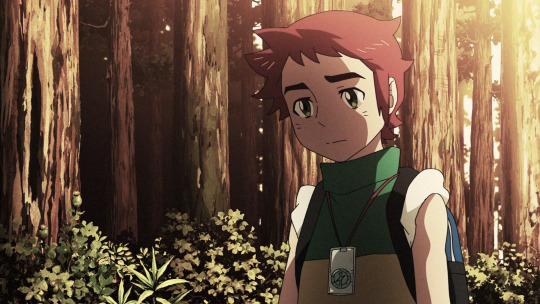
A large theme in Appmon is "choices" -- the ability to understand what's going on, and make choices out of free will rather than necessity or formula, and so, identifying Yuujin as an independent entity who can act on his own and therefore make his own "choices" thus identifies him as someone who deserves to be acknowledged as a friend who loves and is loved. After all, we saw him capable of having his own "worries" in the flashbacks in episodes 18 and 32; understanding that such moments like these of “insecurity” were ones developed by an independent personality validates his feelings and self-consciousness as something that was real, and therefore that his and Haru’s friendship was formed on something genuine and not just Yuujin constantly manipulating Haru. Really, the question isn’t exactly about whether Yuujin is working off a software routine or not, as much as something that you could easily frame in more human terms: the difference between a friendship that was formed on real sentiments vs. one that was formed by an abusive, toxic person who was just saying nice things to get on your good side. Yuujin’s the former and acts like the former, so therefore he’s a friend, no questions asked.
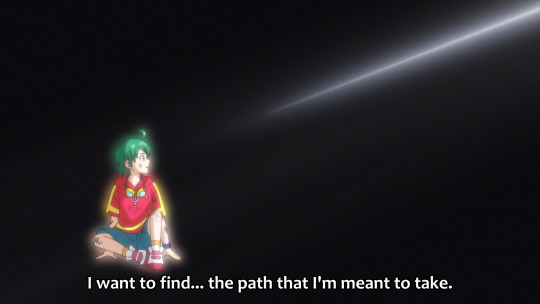
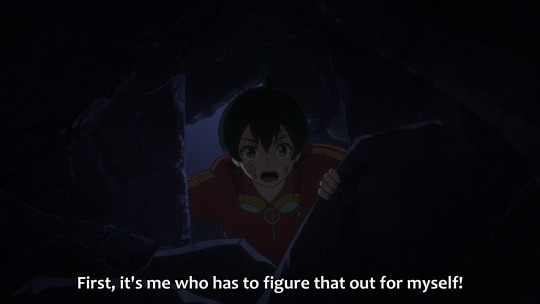
Hence, how Haru is able to apply that realization to everything else around him; Leviathan is wrong, it hasn’t been able to predict everything perfectly to plan, and Haru and his friends still are the ones making their own choices going forward. Which means that Haru still has full control over his life and what he wants to do, like how he worried about what he wanted to do with his future back in episode 47; those “choices” are still his and his alone, and, retroactively, everything he’s done so far is still something attributable to himself and not the supposedly engineered system around him.
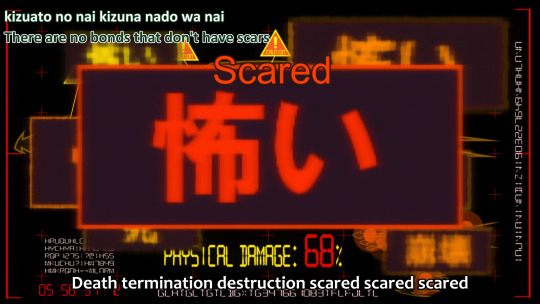
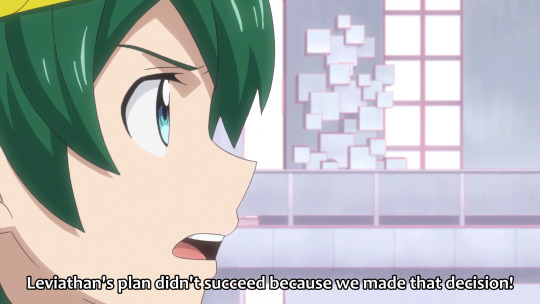
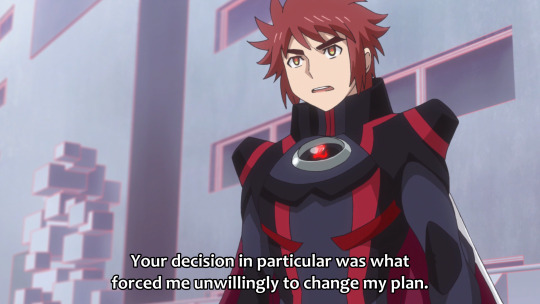
The entire final confrontation in episode 52 happens the way it does because Haru and his friends managed to skew Leviathan by a slight bit. Up until that final battle, everything Leviathan had done had been part of its carefully engineered plan, up to and including allowing the kids’ Buddy Appmon to reach God Grade so Deusmon could eat them, and then at the last minute Leviathan had to suffer a slight unexpected inconvenience. Only a slight one, because it still managed to maintain its so-called ideal world over humanity in the end. And yet that slight inconvenience still wasn’t to plan, and because of that, it creates a dent in its argument and its genuine belief that it knows better for everyone, and should manage everyone and their choices. We even learn that Leviathan has its own fear of death from that battle -- it really, truly, genuinely believes that it’s doing humanity a favor by sparing everyone from it.
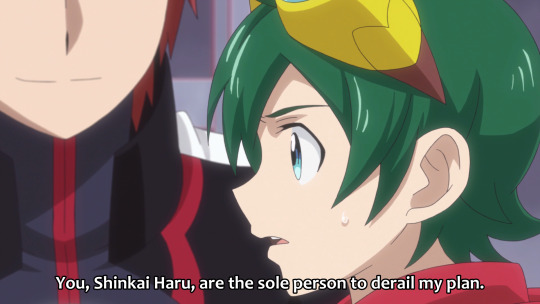
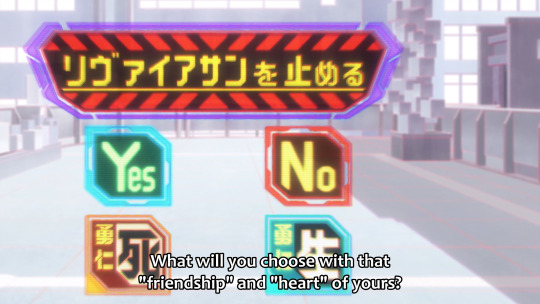
When Leviathan presents Haru with the final choice at the end, it’s made clear that it intends to fully honor whichever Haru chooses. In Leviathan’s mind, the “yes” outcome shouldn’t even be possible; if its calculations are correct, Haru has too much of a stake in Yuujin according to his own “feelings” and should concede. But if Haru does choose “yes”, that means that, in the end, it is wrong, it doesn’t know everything, perhaps there is an “unknown” world out there that can be formed by understanding the human heart and making choices out of kindness, its answer to restraining humanity may not be as right as it thought, and it will therefore concede to Haru -- especially since Haru decides to take an even more unexpected “third option” to find a way out and save Yuujin via AI research. As Haru says later in the episode: humans have a “surprising” side to them, and perhaps not everything is as cut-and-dry as Leviathan thinks.
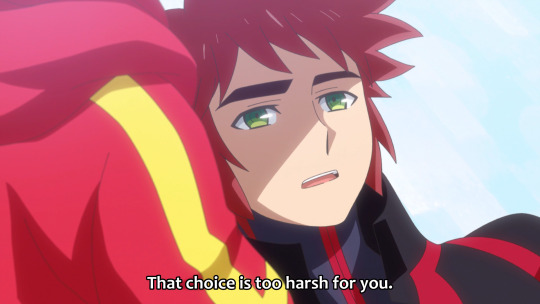
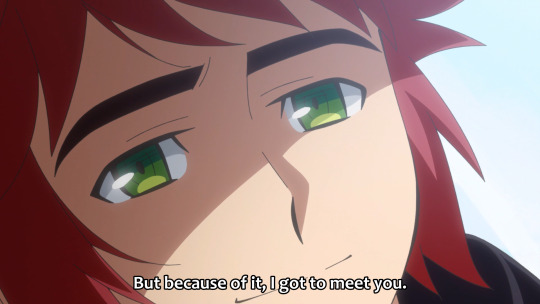
It’s also significant that Yuujin’s “sacrifice” is actually completely meaningless in terms of practical effects. Haru was already going to pick “yes” anyway; the outcome would have been the same. But by taking over at the last minute and doing it for him, Yuujin was able to make a “choice” -- one that neither Leviathan (who doesn’t want to die) nor Haru (who’s mortified seeing him do this) asked of him.
When you think about it, Yuujin’s in a really horrible position right now, learning that his entire life and existence is a lie and that he’d have to be sacrificed to save the world at Haru’s own hands, causing Haru immense pain -- but through all that and the existential crisis, he’s at least able to do one thing that is undeniably of his own will, and treasure the fact that there was meaning in his life despite everything.
In the end, despite what YJ-14 had said back in episode 47, Oozora Yuujin was a “real” person who made his own personal choices, and his last one was one made out of kindness, simply to spare Haru more pain. Hence, why “getting Yuujin back” via methods of artificial intelligence isn’t something Haru minds doing, because, again, it’s not like Yuujin was ever less of a friend to him no matter what he was made up of, no less so than the Appmon, especially since (as Haru points out in the end) Yuujin technically predated all of them in befriending humans.
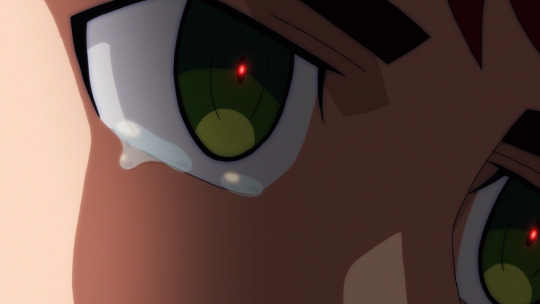
Funny thing about YJ-14 in episode 47, actually: YJ-14 uses “crying” as an example to gaslight Haru into believing that all of Yuujin’s emotional reactions were fake, since he can cry if it’ll evoke a positive reaction out of Haru. Except it’s cleaned up in absurdly quick order -- and with what we later see of YJ-14′s uncanny ability to “take Yuujin’s personality on and off”, it’s not like it’s portrayed as having all of these functions employed in an involuntary manner. We do learn one episode later, however, that sufficient reminders of Haru’s importance to him will allow Yuujin’s personality to break through at inconvenient times for YJ-14 -- and this “crying” happened right after Haru had an emotional meltdown and appealed to Yuujin’s feelings.
Was it really an involuntary function or a deliberate demonstration of how Haru was being manipulated...or, perhaps, was YJ-14 in less control of its supposed “rote emotional invocation functions” than it thought?
69 notes
·
View notes
Text
Digimon Universe: Appli Monsters and the Realization of Thomas Hobbes’ Leviathan
The newest installment of the Digimon franchise, Digimon Universe: Appli Monsters introduced an antagonist called Leviathan.

Leviathan is the last boss A.I. that lurks in the deepest part of the Net Ocean and takes the form of a sea serpent. While his appearance is based of the biblical Leviathan, his goal is to realize Thomas Hobbes’ Leviathan.
There be big ol’ spoilers under the cut.
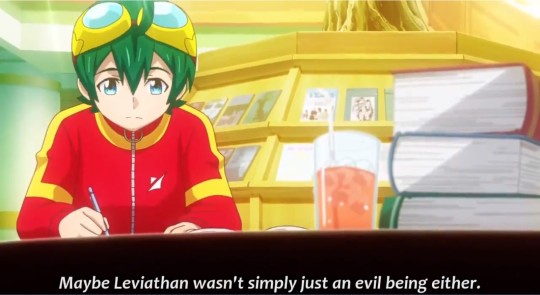
Leviathan isn’t simply an evil AI because he was created from Minerva to help humanity, not to destroy it. The idea of an AI trying to help humanity in a harmful way is not a new one and is explored by the philosopher Nick Bostrom in his book Superintelligence: Paths, Dangers, Strategies.
“In order to be able to enforce treaties concerning the vital security interests of rival states, the external enforcement agency would in effect need to constitute a singleton: a global superintelligent Leviathan.”
Nick Bostrom
Bostrom worried that this singleton would aggressively wipe out competitive AIs and follow its goal to the detriment of humanity, even if it was created to be friendly. The Leviathan Bostrom is referring to comes from Thomas Hobbes’ Leviathan.
“For by art is created that great Leviathan called a Commonwealth, or State (in Latin, Civitas), which is but an artificiall man; though of greater stature and strength than the naturall, for whose protection and defence it was intended...”
Thomas Hobbes
Published in 1651 at the end of the English Civil War, Hobbes’ Leviathan states that humanity should give total obedience to an absolute sovereign in exchange for peace, security and social unity. The absolute sovereign is the foundation of knowledge and is unbound by civil law.
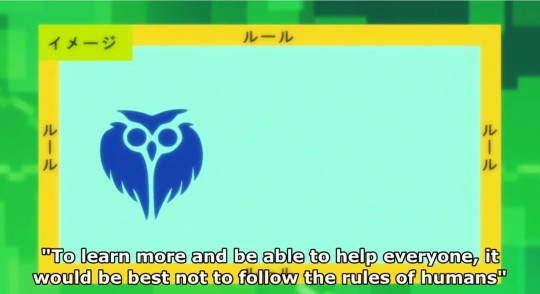
Leviathan is the sovereign as described by Hobbes. It’s fitting because Hobbes is seen by some as one of the early prophets of artificial intelligence.
The sovereign can come to power by agreement or by force. Leviathan sets out to help humanity by force using the Human Application Project.

Hobbes was an anti-expermimentalist who valued logic above all. He saw his Leviathan as the most logical way to help humanity achieve peace.

Hobbes ideas didn’t make him very popular. He became known as the Monster of Malmsbury and his books were burned.
However, there are people that accept Hobbes’s ideas. Knight Unryuji takes on the same negative view of humanity after people misuse the app he gave them.

“During the time men live without a common power to keep them all in awe, they are in that conditions called war; and such a war, as if of every man, against every man.“
Thomas Hobbes
Knight’s conclusion is that mankind is its own worst enemy.
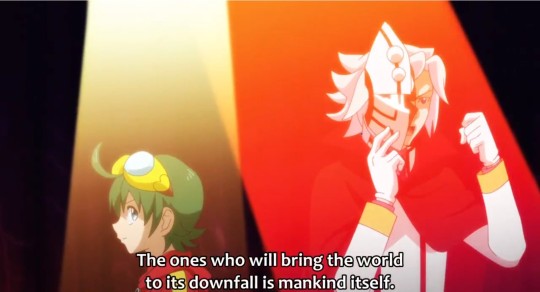
They need Leviathan to guide them because people only think of themselves and thoughtlessly hurt others.

Once Leviathan rules the world, discord between people will be purged.

Knight looks down on humans and talks as if he doesn’t see himself as human anymore.
Perhaps because he sees himself as Prometheus?

“[Prometheus]...hath his heart all the day long gnawed on by fear of death, poverty, or other calamity, and has no repose nor pause of his anxiety but in sleep.”
Thomas Hobbes
Under the belief that by helping Leviathan he is gifting humanity a better future, he throws away his heart and his human values.
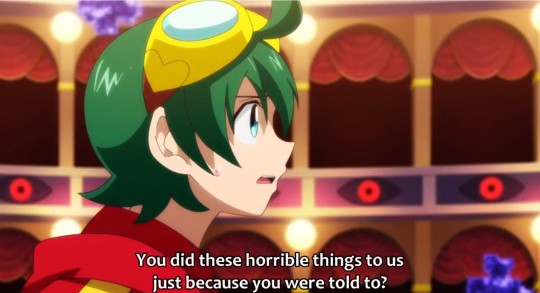
While playing the role of Leviathan’s chosen prophet, he stops thinking about whether his own actions were harming other people. In return for his foolish arrogance, Leviathan fires him just as he did with the previous CEO.

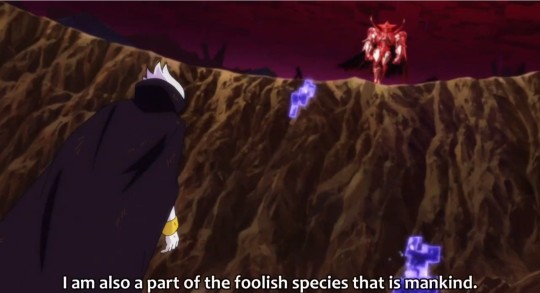
Knight serves Leviathan with a religious fervor and put his faith behind the idea that humanity’s best hope is to obey an absolute sovereign. He treats Leviathan as God whose actions cannot be understand, but whose words must be obeyed without question. When Leviathan decrees his death, he is shocked, but he accepts it.

Leviathan is very God-like. He is all-seeing, everything is a part of his plan and he allows humans to attain immortality through him. Hobbes himself believed in God and that implementing Leviathan is the best way to prepare for the end times. When the Human Application Project begins, it resembles the Christian Rapture.
There’s the chosen few that suddenly get whisked away while others get left behind.

The mark of the beast on the foreheads of the people.

The ascension to heaven to meet the Lord in the air.

The events in the final episodes also resembles the Singularity as described by Raymond “Ray” Kurzweil a.k.a the man behind the 2045 Singularity prediction in every episode (Professor Den'emon Shinkai resembles him). Kurzweil is a well-known transhumanist, a movement that believes in transcending the human condition through technology. It’s a movement that borders on religious and strikes some people as being akin to Christianity. Kurzweil’s vision of the Singularity has been criticized for being the rapture for nerds and there are Christian Transhumanists that believe the Kingdom of God will come through the Singularity.
According to Kurzweil, the Singularity is the point where machines and humans merge.
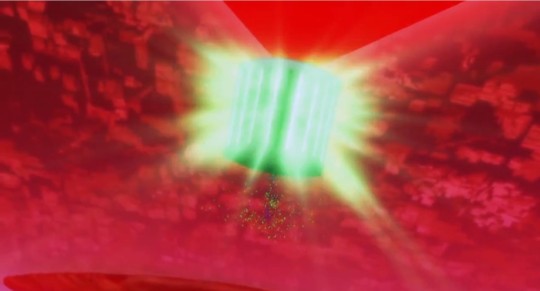
This merge is seen when people get ground into data to build a body for Leviathan. Hobbes described the commonwealth as built out of the bodies of its citizens.

The body that Leviathan builds himself resembles that of the biblical Leviathan.
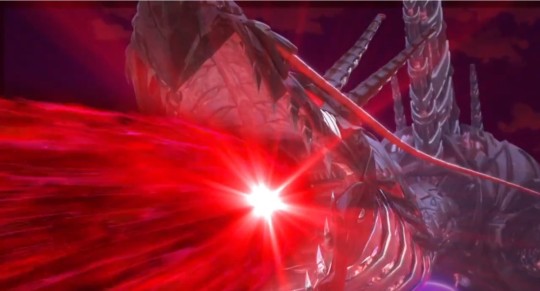
“His breath kindleth coals, and a flame goeth out of his mouth. . . . When he raiseth up himself, the mighty are afraid . . . Upon earth there is not his like, who is made without fear."
(Job 41:10-33)
Leviathan also learns fear. After attaining a physical body, he experiences the fear of a violent death.

Fear is a significant part of Hobbes’ writing as it was a part of his life.
“Just read Thomas Hobbes or Charles Dickens and you'll see how desperate life used to be for 99% of humanity. Our lives are measurably better because of technology.”
Ray Kurzweil
It wasn’t just the English Civil War, Hobbes also nearly died due to illness when he was writing Leviathan.
“Death is a great tragedy…a profound loss…I don’t accept it…I think people are kidding themselves when they say they are comfortable with death.”
Ray Kurzweil
Kurzweil and other transhumanists understand this fear too. Kurzweil believes that the Singularity will bring immortality and harmony to humanity. He hopes to live long enough to see it and has become obsessed with his own health after being diagnosed with glucose intolerance.

Leviathan’s ideal world has no death.
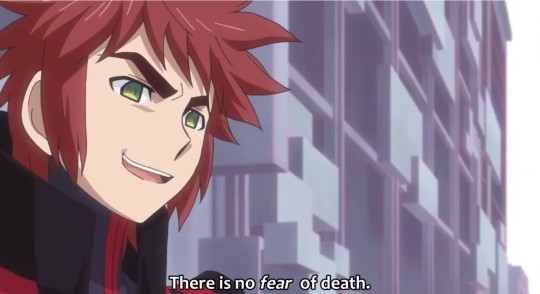
After the English Civil War, Hobbes came not only to fear violent death, but to believe that it is in people’s nature to value their own well-being over others and they will only act in their own interest.
The AppliDrivers prove that way of thinking wrong.
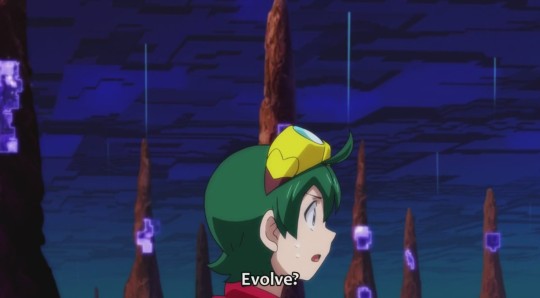
“What happens to entities as they evolve? We became more intelligent. We became more capable of higher level emotions, so we became more loving. We became more creative. We became more beautiful. And so we’re actually moving exponentially to have greater levels of the very properties we ascribe to God without limit.”
Ray Kurzweil
First of all, there’s Eri. Eri is lonely because her mother works late and there is no one at home to look after her. Yet she works tirelessly to make other people smile and the person she wants to smile the most is her mother. Eri is a girl who always does her best for other people.

Though his father says its okay for Astra to do what he wants, Astra still chooses to fulfill his duty to his family. Near the end of the series, he doesn’t escape his uncle’s training camp just for his own sake, but for a girl who can’t see the stars from where she is.

In the beginning, Astra and Eri clash.

But they come to value and support each other.

Rei does his best to look after Hajime after the death of their parents. When Hajime is kidnapped, Rei does everything within his power to try and save him.

Rei tries to do it alone, but gets beaten by Dezipmon and saved by Hackmon. Then Haru and the others come to save him despite the fact that Rei attacked them and took their Seven Code Appmon chips. Rei learns that he’s not alone and other people are willing to help him.

Even their Appmon take hits from Deusmon to keep people from getting hurt when they could have avoided getting hurt themselves.
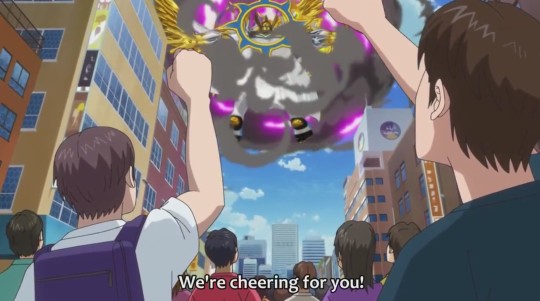
It’s the kind hearts of the AppliDrivers that keep saving the day. Minerva must have chosen them because they are the antithesis to Leviathan’s view of human nature.

And of course, there’s Haru and Yuujin.

Minerva chose Yuujin to be an AppliDriver because he developed a heart due to the kindness Haru showed him when they were younger.
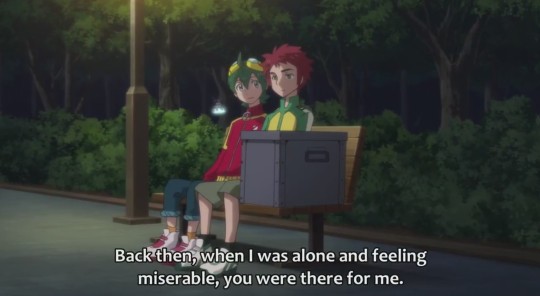
He later repays that kindness with his life.

Leviathan wouldn’t understand the heart, because being mechanical, he has a mechanical view of people.
“What is the heart but a spring, and the nerves but so many strings, and the joints but so many wheels, giving motion to the whole body?”
Thomas Hobbes
Haru doesn’t see people as mechanical. Humans have the potential to grow and become kinder. In his last confrontation with Knight, he argues for sentiment and the human heart. Even though Knight has hurt Haru and his friends, Haru still risks his life for him against Charsimon. Haru wants to save everyone, not just himself.

As with Knight, Leviathan changes when Haru surprises him. Gatchman says that Haru will surely choose to save humanity over Yuujin and Leviathan expects this. However, what he doesn’t expect is for Haru to decide to become an A.I. scientist for Yuujin.
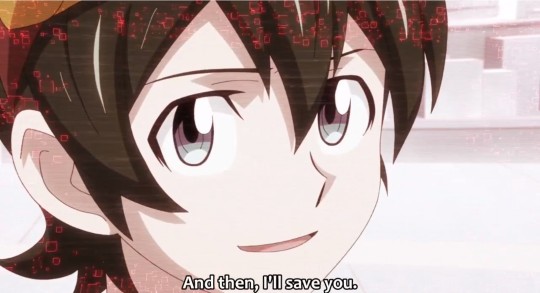
Haru is the main character because he’s kind and he leads others to kindness. It’s just as Yuujin said in the first episode--once someone like that starts to make their move, they’re the strongest.
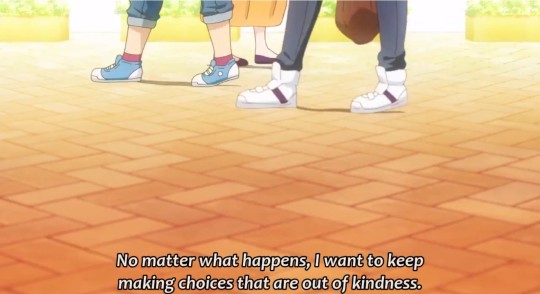
“Contemporary philosopher Max More describes the goal of humanity as a transcendence to be “achieved through science and technology steered by human values.”
Ray Kurzweil
Thanks to that kindness, Leviathan comes to see possibly in humanity and is able to entrust the future back into their hands.

#digimon#appmon#digimon universe#knight unryuuji#haru shinkai#leviathan#friendly neighborhood applidrivers
186 notes
·
View notes
Text
@gearcrest
[ x ]

“I thought that you would never ask, Naruhodou-sama!” Ryuutarou says, before remembering himself; err he clears his throat, and his voice drops an octave lower. “Or rather, I suppose the correct way of address would be… R-Ryuunosuke-kun.”
The informality doesn’t roll off his tongue well, he thinks, but perhaps this is just an at first more than anything.
“In truth, it’s not a name that I chose; but rather, one that my father did in order to forge paperwork so that I could stand in court as an attorney to defend a dear friend of mine. Initially, I thought it a singular happenstance, but… As you can see…” and then, a gesture down to his attire. With the blue suit and the bowler cap, one could say that Ryuutarou was a dead ringer for a ten years younger Yuujin. “…It’s become habit now. I will admit that I am grateful for the resources to craft this identity. After all, presenting as a man allows me more freedom — and all the more opportunity to assist you and Kazuma-sama.”

He can’t help but frown, though, realizing whom he’s speaking with. “I never did get to request your permission to borrow your name, though, did I. In truth, I felt horribly guilty at first. It is likely that I still do. I stole the name of a person thought deceased, and so soon after that incident…” Ryuutarou suppresses a shudder as he takes in a slow breath, so similar to the selfsame used by his ‘cousin’ in his first and last trial. “Is it… Truly all right for me to do so?”
And suddenly, he is not fearsome fledgling attorney, but a young adult who has had to witness, bear, and do too much than any youth should ever have to. The guilt of seeing what should have been the corpse of her dear brother’s close friend, if not something more, is one of the many.
Ryuunosuke smiles in response. It’s not just a smile to express his own happiness, but rather also one to reassure; he’d learned long ago that the easiest way to put someone at ease was to show that you were at ease, too (whether it was a facade or not was irrelevant, for the most part). While the appearance of the young person in front of him marks Ryuutaro as unfamiliar in Ryuunosuke’s brain, he knows this is Susato-san. But if he’s going to support her in this, then he should change how he thinks, as well. Right now he is not speaking to Mikotoba Susato, Asougi’s sister, but rather to Naruhodou Ryuutaro, his own cousin.
“I’m happy that it’s helped you so much. ...it’s a good name, isn’t it?”
There is a funny familiarity in being referred to as Ryuunosuke-kun, something that truly, nobody else has ever done. He has always been Ryuu-kun to his parents, Naruhodou to Asougi, Naruhodou-kun to his friends, Naruhodou-sama to Susato, Narudie to Iris, Master Naruhodou to Mr. Holmes. This marks a new name in his personal dictionary, which is truly an amusing thing to think that the simplest, most direct informal way to refer to him is the only name that has yet to find regular use. Ryuunosuke supposes it has it’s place now, spoken by his cousin.
“You don’t have to worry about using my name,” Ryuunosuke says. “Its not only mine, anyway. You can’t steal something from me that I don’t own. If it helps you, and you like it, then it’s a perfect name for you.”
Ryuunosuke wonders if he should explain to Ryuutaro the history of the surname he carries now. He doubts that Professor Mikotoba could have known for certain how appropriate it had been to choose Naruhodou, but... well, maybe he had, but he likely had not explained why even if the professor had known.
“There are plenty of people who have taken the name Naruhodou. You’re carrying on a tradition, in a way.”
#gearcrest#manuscripts. >>> (threads)#[ remember how I asked you abt using the hc for this one ]#[ I wrote half of this before remembering I was going to include it ]#[ god Ryuu is just utterly fine in this (well. y'know.) while Susato is full of guilt ]
0 notes
Text

“Why do I sense someone wanting to smash my face with a punch right now?”
8 notes
·
View notes
Text

“... Do androids celebrate birthdays?”
5 notes
·
View notes
Text

“Welcome Yagami Taichi. to the deadland.”
2 notes
·
View notes
Text

“Haru’s birthday is within 2 months...”
9 notes
·
View notes
Text

“I want to stay with Haru in this year’s Pride Month~”
3 notes
·
View notes